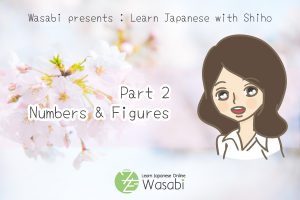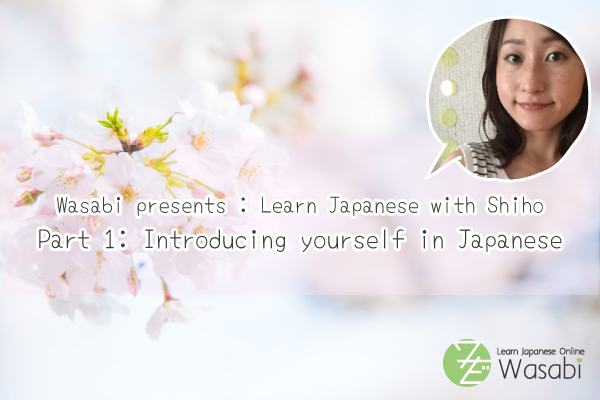How to introduce yourself in Japanese (Easy to detailed self introduction)
Whatever your reason for learning Japanese, you will probably end up in a lot of situations where you need to introduce yourself. Therefore, we have compiled a few sentence structures, some vocabulary and other important points you can use for your own self-introduction.
| Table of Contents [How to start your self-introduction] [Stating your name] [Stating where you are from] [Stating your occupation] [Stating your hobbies] [Wrapping up] |
[How to start your self-introduction]
The very first word you will need to start your self-introduction with is “初めまして (Nice to meet you)”. Saying “初めまして” is considered polite upon meeting someone for the first time and will help you leave a good impression.
初めまして。
Nice to meet you, something you say upon meeting someone for the first time
[Stating your name]
After beginning with “初めまして”, the natural thing to do next is telling the other person your name. There are several ways to say your name:
| 私は___です。 | I am ___. |
| 私___と言 | I am called ___. |
| 私 |
My name is ___. |
So, for example, you can say: “私
| 私 |
My name is ___. Please call me ___. |
So, for example you could say:
| 私 |
My name is Shiho. Please call me Clara. |
[Stating where you are from]
The next thing to do is let everyone know where you are from. For the place, you can use your country or hometown, depending on the situation you are introducing yourself in. Usually, as a foreigner in Japan, it is most common to state your country.
| 私 |
I am from ___. |
If where you were born/are from originally and where you currently live are two different places, you can follow up by specifically stating where you are residing at the moment:
| 今 |
Currently I am living in ___. |
So to give you an example, you could say:
| 私 |
I am from Tokyo. Currently I am living in Osaka. |
[adsense]
[Stating your occupation]
Next up, you can let everyone know what your current occupation is. The hard thing about this might actually be knowing what your own occupation means in Japanese, so don’t forget to look it up beforehand! Also, see the different version for stating when you are a student and what you are studying:
| 仕事 |
I work as a/an ___. |
| 大学 |
I study ___ at university. |
You can follow up on this and give more specifics by mentioning where exactly you work.
| 職場 |
I work as a/an ___. |
So for example, you could say:
| 仕事 |
I work as a middle school teacher. My workplace is in Kyoto. |
| 大学 |
I study economics at university. |
You can also combine stating your work and workplace in one sentence. In that case, please try using the following sentence.
| 仕事 |
I work as a/an ___ and my workplace is near ___. |
[Stating your hobbies]
The next part is really important. To have everyone know what kind of person you are, you can talk about your hobbies or other important things in your life. You can also line up several hobbies by using the particles “と” or “や”.
| 趣味 |
My hobby is ___. |
| 趣味 |
My hobbies are ___ and ___. |
So for example, you could say:
| 趣味 |
My hobbies are traveling and painting. |
If you have a lot of hobbies, it’s best not to say them all in one sentence. If you have a wide variety of interests and would like to introduce them all, say your most favorite ones first. Then you continue the sentence with “あとは (Furthermore)”. See the example below:
| 趣味 |
My hobbies are watching movies, painting, and photography. Furthermore, I like shopping and traveling. |
If you would like to elaborate even further, you can explain why exactly you like these things. Since Japan values food very highly, something that can also be mentioned when introducing yourself is what kind of food you like or dislike.
| 好 |
My favorite food is ___. |
| 嫌 |
Food I dislike is ___. |
Furthermore, you could talk about what you like to do on your day off. That way, you can give people an idea as to what you are up to on weekends and try to let them know what kind of person you are.
| 休 |
On my day off I like to ___. |
Example:
| 休 |
On my day off I like to go to the gym and work out. |
[Wrapping up]
Since most of you reading this article are probably Japanese learners, one final thing you can let everyone know is why you started learning Japanese. Mostly every Japanese person will be curious about this, so here is how it goes:
| 日本語 |
The reason I started learning Japanese is ___. |
Example:
| 日本語 |
The reason I started learning Japanese is because I like Anime. |
Now, the final step of your self-introduction is wrapping everything up and giving it a natural sounding ending. There are several ways you can end your self-introduction naturally. Pick one of the following:
| よろしくお願 |
Rough translation: I look forward to working with you/Please treat me well. |
| これで終 |
That’s it! |
| 以上 |
That’s all (very formal). |
“以上
Lastly, why don’t you revise Shiho’s own self-introduction and see if you can come up with something similar?
皆さん、初めまして。私はしほと言います。私は東京出身で、今も東京に住んでいます。私の趣味は外国の映画やテレビドラマを観ること。それから、美味しいものを探したり、食べたりすることです。好きな映画はほんっとにたくさんあるんですけど、特に好きなのは「キューティ・ブロンド」という映画です。この映画はもう何十回も観たことのある、私にとって特別な映画です。
好きな食べ物もすごくたくさんあります。特に好きなのはスイーツとか、和食、イタリア、それからタイ料理等の、エスニックですね。そういったものをよく食べています。
もっと色んな国の、色んな料理を食べてみたいなーといつも思っています。
あとは、運動したりとか、ショッピングをすること。それから、旅行に行ったり、カフェでのんびり本を読んだりするのもすごく好きです。
では、私の自己紹介はこれで終わりにしたいと思います。皆さん、よろしくお願いします。
If any of the grammar used in this article is unclear, head over to our full list of Japanese grammar reference.
| 初めまして | Nice to meet you |
| 場面 |
Scene, setting |
| 仕事 |
Work |
| 勉強 |
Studies |
| 勉強 |
Studies |
| 大学 |
University |
| 出身 |
A person’s origin, birthplace |
| 趣味 |
Hobby, pastime |
| 旅行 |
To travel |
| 絵 |
To paint |
| 例 |
For example |
| 休 |
A day off |
| 実際 |
In practice, actually |

For Girls, How to Propose to a Boy in Japanese

How to count and use numbers and numerals in Japanese



